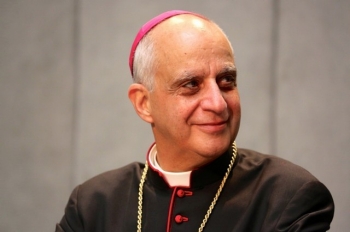Msgr. Fisichella and the planning of the Jubilee of Mercy

Your Excellency, what can be expected in Rome during the Holy Year of Mercy in support of the persecuted Christians in the Middle East?
Pope Francis desired and proclaimed the Jubilee of Mercy so that all might feel close to God’s Mercy, especially those who suffer, who are experiencing trials and are in need of consolation. The Pope desires that all people, through gazing at the face of Jesus, will feel loved and comforted. Among those experiencing trials are, without a doubt, Christians in the Middle East, who currently live in persecution and face a daily battle in professing their faith. Particular attention to these Christians and their suffering will not be lacking over the course of the Holy Year.
How might the Jubilee of Mercy be lived in a concrete way? For example, while on pilgrimage to the Holy Land, is there a particular “way” that you would suggest?
The Holy Father and the Pontifical Council for Promoting the New Evangelization have provided, and will continue to provide, guidelines for celebrating the Jubilee all over the world. Various local groups will then take these common guidelines and apply them to their contexts. The same will be true in the Holy Land, where I am sure that the Custody of the Holy Land, together with bishops and other leadership, which I think will include the Order of the Holy Sepulchre, will find the best way to celebrate the Holy Year in Jesus’ Land.
In support of the “culture of encounter” that Pope Francis has promoted, will you organize any interreligious events, particularly with Muslim representatives?
The Year of Mercy will also ensure special attention to ecumenism. In fact on January 25 there will be a celebration at St. Paul Outside the Walls. Furthermore, special attention will be given to interreligious dialogue in line with Pope Francis’ message in Misericordiae vultus: “There is an aspect of mercy that goes beyond the confines of the Church. It relates us to Judaism and Islam, both of which consider mercy to be one of God’s most important attributes. Israel was the first to receive this revelation which continues in history as the source of an inexhaustible richness meant to be shared with all mankind. As we have seen, the pages of the Old Testament are steeped in mercy, because they narrate the works that the Lord performed in favour of his people at the most trying moments of their history. Among the privileged names that Islam attributes to the Creator are ‘Merciful and Kind’” (n. 23).
In your opinion, in what way can the 30,000 members of the Order of the Holy Sepulchre around the world participate in and contribute to this Jubilee? What appeal is addressed to them?
As an appeal to the members of the Order of the Holy Sepulchre, I would like to use Pope Francis’ words at the conclusion of Misericordiae vultus, which are addressed to the whole Church: “In this Jubilee Year, may the Church echo the word of God that resounds strong and clear as a message and a sign of pardon, strength, aid, and love. May she never tire of extending mercy, and be ever patient in offering compassion and comfort. May the Church become the voice of every man and woman, and repeat confidently without end: ‘Be mindful of your mercy, O Lord, and your steadfast love, for they have been from of old’ (Ps 25:6)”.
Interview by François Vayne
(September 12, 2015)



